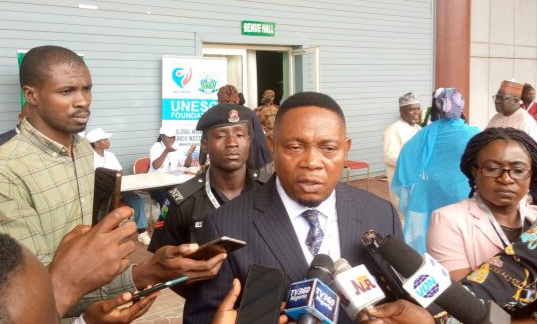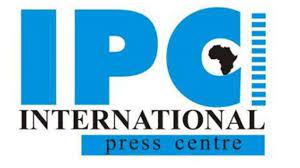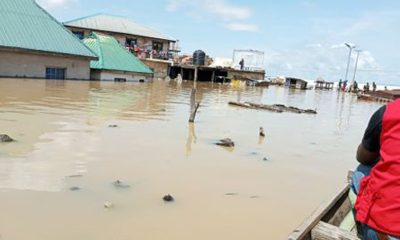Foreign News
GMRI seeks collective effort in tackling irregular migration

GMRI seeks collective effort in tackling irregular migration
The Global Migration Research Institute (GMRI), U.S. on Tuesday called for collective efforts among stakeholders to tackle irregular migration in Nigeria.
Dr Williams Azuma-Ijoma, President, GMRI, U.
S., made the call in Abuja at a National Workshop on Migration Issues it organised in partnership with the Universal Migration Enlightenment Centre (UMEC), Nigeria.The workshop had the theme: “Tackling Migration as a Diverse Problem for Sustainable Growth and Social Progress.”
According to Azuma-Ijoma, the aim of the workshop is to address one of the most pressing issues in the country, which is migration, and explore how to work together towards a better future.
“Migration in all its dimensions has emerged as a complex challenge affecting nations worldwide.
“Today, we are here to delve into the core of this problem and to chart a course towards sustainable growth and social progress,” he said.
Food Crises : Group Calls for Enpowerment of Women, Vulnerable People
Azuma-Ijoma said that though the Nigerian government had made commendable efforts in implementing policies and initiatives aimed at combating migration-related challenges, there are still rooms for improvement.
He said that migration remained a pressing concern in Nigeria and it was incumbent upon all to ensure a sustained and intensified effort.
The GMRI president said that there are specific areas that the Nigerian government and concerned agencies should focus on to address migration more effectively.
“Firstly, accurate and up-to-date data is essential to understand the patterns, causes and consequences of migration.
“It will enable us to develop evidence-based policies and programmes that can effectively manage migration flows, protect vulnerable individuals and allocate resources appropriately.
“Therefore, the Nigerian government should invest in strengthening data collection mechanisms and encourage research institutions to contribute towards a robust knowledge base on migration,’’ he said.
Azuma-Ijoma added that there was a need to prioritise the implementation and enforcement of existing policies and laws.
He said that concrete steps needed to be taken to ensure that policies are effectively enforced at all levels, leaving no room for gaps or weaknesses.
Azuma-Ijoma said that this included collaborating with relevant agencies to combat human trafficking and irregular migration while providing support and protection to victims.
He said that it was vital to establish partnerships and strengthen cooperation with other nations and international organisations.
The GMRI president noted further that there was also the need to focus on addressing the root causes of migration.
These root causes of migration, he said, included economic disparities, political conflicts, environmental degradation and lack of opportunities, and drove people to migrate in search of a better life.
“To tackle these underlying factors, the Nigerian government should prioritise sustainable development and inclusive growth.
“This is by creating an environment that fosters economic opportunities, social equity and environmental sustainability that can reduce the desire or need for individuals to migrate,’’ he said.
Azuma-Ijoma also stressed the need to equip youths by investing in education, skills development and ensuring they get gainfully employed or empowered.
The Acting Comptroller General, Nigeria Immigration Service, Wuraola Adepoju, in her paper presentation titled, “Issues and Dangers Of Irregular Migration”, said migration could be profitable, however irregular migration was dangerous.
Represented by an Assistant Comptroller General (ACG), Ngozi Odikpo, Adepoju said that at least 1.3 million Nigerians are facing irregular migration challenges across the world.
“Just yesterday, Sept. 25, 160 stranded Nigerians were returned from Libya. This is coming just less than weeks when 155 irregular migrants were voluntary returned.
“The evacuees were trapped in Libya as irregular migrants on the verge of a perilous journey to Europe and other parts of the world.
“More than 6,500 stranded Nigerians have been returned from Libya under the IOM Voluntary Humanitarian Repatriation (VHR) in 2023,” she said.
Adepoju urged Nigerians to desist from irregular migration, as the nation made concerted efforts towards enhancing migration governance to harness the benefits of migration. (NAN)
GMRI seeks collective effort in tackling irregular migration
Foreign News
CAF Sanctions Kenya Again over Crowd Trouble

The Confederation of African Football (CAF) has sanctioned African Nations Championship (CHAN) co-host, Kenya, for the second time in as many weeks over security breaches.
In a statement made available on Monday evening, the continental governing body said that it has limited entry to the 48,000-seat Moi International Sports Centre.
It also said that, known as Kasarani Stadium, can accommodate 27,000 fans for Sunday’s Group A match between Kenya and Zambia.
CAF said only electronic ticket holders would be allowed into the stadium, with thermal tickets prohibited.
The governing body warned that Kenya’s matches could be relocated from Kasarani Stadium if organisers fail to prevent further breaches.
“We trust these measures will be applied swiftly to protect competition’s integrity, ensure fan safety, and uphold confidence in Kenya’s commitment to the tournament,” CAF said.
The sanctions follow incidents on Aug. 10 when Kenya defeated two-time winner Morocco 1-0 in spite of playing the entire second half with 10 men.
The win put Kenya top of Group A with seven points.
The debutants would reach the quarterfinals with at least a draw against winless Zambia.
Last week, Kenya’s football federation was fined nearly 20,000 U.S. dollars for security lapses during the team’s 1-0 win over DR Congo in the tournament opener on Aug. 3.
In the latest case, CAF cited major lapses, including stadium gates and restricted service areas being overrun by ticketless spectators and holders of government-distributed physical tickets.
It also accused security personnel of losing control at exit points and allowing breaches of the perimeter fence that enabled thousands of ticketless fans to enter.
CAF had expressed alarm over the use of tear gas and flash grenades, reports of live ammunition fired near spectators and staff, and violent incidents such as stone-throwing at security personnel.
It also cited unsafe vehicle movement in spectator areas, inadequate police response, and the lack of medical incident reports in spite of injuries being reported.
Organisers were further criticised for insufficient communication tools and the absence of CCTV coverage at critical entry points.
Foreign News
Madonna Urges Pope Leo to Visit Gaza

Pop icon Madonna has made an appeal to Pope Leo XIV, urging him to visit the blockaded Gaza Strip amid a starvation crisis that has sparked international outrage.
“You are the only one of us that cannot be denied entry,” the U.S. singer wrote on social media platform X late on Monday.
“We need the humanitarian gates to be fully opened to save these innocent children.
“There is no more time,” she added.
Marking the 25th birthday of her son Rocco Ritchie on Monday, Madonna also announced plans to donate to humanitarian organisations working in Gaza.
“I feel the best gift I can give to him as a Mother is to ask everyone to do what they can to help save the innocent children caught in the crossfire in Gaza,” she wrote.
A United Nations (UN) agency said late last week that “acute malnutrition among children in Gaza has reached the highest levels.”
In July alone, nearly 12,000 children lower than five in age were identified as acutely malnourished, with another 2,500 found to suffer from severe acute malnutrition.
According to the UN Office for the Coordination of Humanitarian Affairs (OCHA), this is the most life-threatening form.
Israel controls access roads to Gaza and has sealed off the coastal area.
Very little aid got into Gaza from March through May, when Israel began allowing in deliveries using a controversial private system that bypasses traditional UN agencies.
Under pressure from allies, Israel recently began permitting larger convoys into the territory, as aid airdrops take place overhead.
On Sunday, Irish rock band U2 issued a stinging critique of the Israeli government’s actions.
“We know Hamas are using starvation as a weapon in the war, but now so too is Israel and I feel revulsion for the moral failure,” frontman Bono wrote.
Foreign News
Putin Bans Foreign-made Clothing for Russian Army From 2026

Russian President Vladimir Putin signed a decree on Monday banning the procurement of foreign-made clothing and related gear for the country’s armed forces starting in 2026.
According to the decree, from Jan. 1, 2026, all uniforms and other clothing items for the Russian Armed Forces must be produced by Russian companies whose manufacturing facilities are located within the country.
By 2027, the requirement would extend to fabrics and knitted materials used in production, which must be domestically manufactured.
The measure aims to entirely exclude the purchase of foreign-made clothing and materials for the needs of the military, the decree said.
Military clothing and gear include uniforms, insignia, underwear, bedding, special clothing, footwear, equipment, and sanitary items.
Such supplies are procured through the Russian state defence order system.


















